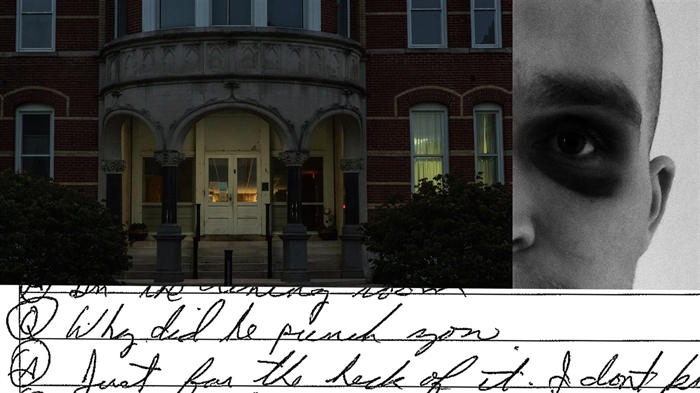Alex Bandoni/ProPublica (Source images: Whitney Curtis for ProPublica; document and photo from Illinois State Police file obtained by Capitol News Illinois and Lee Enterprises Midwest)
By BETH HUNDSDORFER
Capitol News Illinois
MOLLY PARKER
Lee Enterprises Midwest
This article was produced for ProPublica’s Local Reporting Network in partnership with Capitol News Illinois and Lee Enterprises .
As Blaine Reichard rose from a breakfast table at the Choate Mental Health and Developmental Center in southern Illinois, a worker ordered him to pull up his sagging pants.
A 24-year-old man with developmental disabilities, Reichard was accustomed to workers at the state-run residential facility telling him what to do. But this time he didn’t obey.
“I’m a gangsta! This is how we do it where I am from!” responded Reichard, who, despite his street-tough defiance, still slept with a teddy bear.
Investigators who later came to the scene of the 2014 incident heard various versions of what happened next. But multiple witnesses told the Illinois State Police that shortly after this exchange, Reichard was taken to the floor, held down by four mental health techs and repeatedly punched in the face, according to a 700-page state police investigation obtained under the Freedom of Information Act.
Reichard cursed and spat, trying to fight back. His resistance was met with more blows, according to witness accounts. Reichard, whose diagnoses include autism, would later tell police it felt like he was hit 100 times.
Multiple employees, including a doctor, told investigators that Reichard’s injuries were the worst they’d ever seen. One tech told police she vomited at the sight of his injured face.
Located about 120 miles southeast of St. Louis, Choate serves people with the most profound disabilities in the state. In 2009, the U.S. Department of Justice’s Civil Rights Division had cited Choate for failing to protect residents from physical and psychological abuse and other harm. The federal agency stopped short of suing the state of Illinois — a step it has taken against other states — and closed its investigation in 2013, saying in a report to Congress that Illinois officials had made adequate improvements.
The Reichard beating happened the next year, just before Christmas. While it is one of the most egregious examples of abuse of a Choate resident in a decade, a monthslong investigation by Capitol News Illinois, Lee Enterprises and ProPublica has found that the incident is one of many instances of mistreatment at the rural facility managed by the Illinois Department of Human Services.

Reporters from this team filed more than 50 public records requests, reviewing thousands of pages of internal documents from IDHS and its inspector general; the Illinois State Police; officials in Union County, where the facility is located; and other entities.
The documents and interviews with current and former employees and advocates, and with residents and their guardians, revealed a systemic pattern of patient abuse, neglect, humiliation and exploitation.
Over a 10-year period running through 2021, the state police opened at least 40 criminal investigations into alleged employee misconduct at Choate, more than at any of IDHS’s other facilities in southern Illinois.
Using court records and Illinois State Police case files, reporters found that at least 26 Choate employees were arrested on felony charges over roughly the same time period, including four who were connected to the Reichard case. Employees have since been accused of whipping, choking, punching and raping residents.
Among the more recent arrestees are four employees who were accused of choking and beating another Choate patient in 2020, leading to felony battery charges. Two have pleaded guilty to misdemeanor battery charges in exchange for probation sentences and two cases are still pending.
In 2020, an employee was charged with felony battery, for allegedly taking off his belt and using it to repeatedly whip a resident. Then, earlier this year, an employee was charged with criminal sexual assault of an intellectually disabled person who lived at the facility. And in another 2022 case, an employee was charged for allegedly grabbing a nonverbal patient with the mental capacity of a 15-month-old by the neck and punching him in the back of the head as a security officer watched, according to court records. These three cases are still pending.
Over the years, advocates have called for the facility to be closed. “It’s a purely political decision to keep Choate open,” said civil rights attorney Thomas Kennedy, who has provided legal services to Choate patients on and off for decades. “It’s not about helping people. It’s not about habilitating or rehabilitating people. It’s about keeping jobs in the community. Period. They have failed miserably at any other mission.”
In a statement to reporters, IDHS spokesperson Marisa Kollias acknowledged the seriousness of the concerns at Choate. She said that the problems are the “result of longstanding, entrenched issues dating back decades” and that the agency has “taken aggressive measures over the past several years to unravel them.” That includes increasing staffing and training and appointing Equip for Equality, an independent legal advocacy organization, to monitor conditions inside the facility, just as IDHS did in response to troubling conditions there nearly 20 years ago.
A spokesperson for the Justice Department provided the news organizations with the congressional report announcing its official exit from Choate, which included a commitment to continuing to monitor conditions there. She declined to answer additional questions.
Tomorrow: “Strapped To His Bed For Hours”








